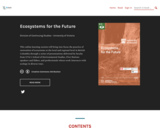
Short Description:
This online learning session will bring into focus the practice of restoration of ecosystems at the local and regional level in British Columbia through a series of presentations delivered by faculty from UVic’s School of Environmental Studies, First Nations speakers and Elders, and professionals whose work intersects with ecology in diverse ways.
Long Description:
How often have you heard in the past five years the expression “I have never seen a ….fire/flood/drought/rainstorm/insect infestation/sea level rise…of this magnitude, ever.”? The world’s climate is out of balance, and in this state, is driving ecosystem changes that few of us have seen in our lifetimes. What is the scale of these changes now and into the future? How will this affect the way you work and live? How can we adapt? The practice of ecological restoration can point the way to positive actions at the ground level.
This online learning session will bring into focus the practice of restoration of ecosystems at the local and regional level in British Columbia through a series of presentations delivered by faculty from UVic’s School of Environmental Studies, First Nations speakers and Elders, and professionals whose work intersects with ecology in diverse ways. We start by rooting our introduction in Indigenous perspectives on how the local ecosystems are changing. We discuss basic principles and practices of ecological restoration on the ground. We then explore the complexity of British Columbia’s biodiversity, basic drivers of change in ecosystems, and the challenges they present in different types of ecosystems. We look at how climate change models help us understand what the future scale of change might be, and we finish up by discussing how ecological restoration principles can apply to different disciplines.
This course is part of the Adaptation Learning Network led by the Resilience by Design Lab at Royal Roads University. The project is supported by the Climate Action Secretariat of the BC Ministry of Environment & Climate Change Strategy and Natural Resources Canada through its Building Regional Adaptation Capacity and Expertise (BRACE) program. The BRACE program works with Canadian provinces to support training activities that help build skills and expertise on climate adaptation and resilience.
Word Count: 4278
(Note: This resource's metadata has been created automatically by reformatting and/or combining the information that the author initially provided as part of a bulk import process.)
- Subject:
- Atmospheric Science
- Career and Technical Education
- Environmental Studies
- Physical Science
- Material Type:
- Textbook
- Author:
- Division Of Continuing Studies - University Of Victoria
- Date Added:
- 10/11/2021